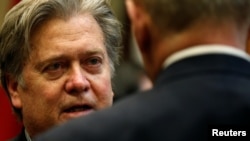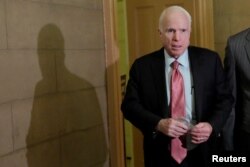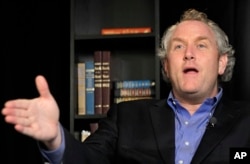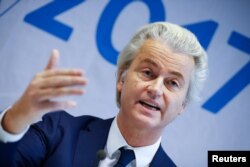Breitbart News, the iconoclastic far-right website run until recently by White House strategist Steve Bannon, is planning to push deeper into Europe and to open bureaus soon in Germany and France to add to one already in London.
And already European officials are dubbing Breitbart the “Voice of Trump.”
They warn that if Breitbart is used as a propaganda vehicle by the new administration, it will aggravate already raw relations with European Union governments.
The misgivings of European officials about Breitbart have mounted since Bannon's appointment to a seat on the principals' committee of the National Security Council — an elevation that suggests the 63-year-old will be advising not only on domestic policies but also on geopolitics.
White House press spokesman Sean Spicer dismissed concerns about the appointment as “much ado about nothing,” pointing out on Monday that Bannon has served in the U.S. military and has an “extensive background on geopolitical affairs.”
McCain concerned
But U.S. critics, including Republican Senator John McCain, chairman of the Senate Armed Services Committee, have called Bannon's inclusion “a radical departure from any National Security Council in history.”
For now, in public, many European officials are maintaining a wait-and-see approach.
“We will not get, as the Brits would say, our knickers in a twist because we do not know exactly what the Trump administration will do,” Dutch Ambassador Henne Schuwer said at an event in Washington last week.
A spokesman for Breitbart declined to comment on the record when contacted by VOA. But Breitbart itself makes light of the controversy on its website, ridiculing those mainstream media whose reaction to its expanded influence "has run the gamut from bewildered hostility to turgid hysteria, and not much in between."
A creeping anxiety
Behind the scenes, many European officials speak of a creeping anxiety that the website, which claims 45 million unique monthly visitors, will seek to stir anti-establishment fervor in Europe much as it is accused of doing in the United States.
“The worry is that Breitbart will be a vehicle for weaponized information with planted stories useful to advance Bannon's Euro-skeptic agenda — much as the Kremlin uses Russia Today for the same purpose," said a senior European Union official who spoke to VOA on condition of anonymity so as not to antagonize the new U.S. administration.
Europe has key elections this year in Germany, France and the Netherlands and possibly in Italy, and in all of them far-right parties that view Breitbart and Bannon as allies are serious contenders.
The European Parliament's chief Brexit negotiator, Guy Verhofstadt, who's running for the presidency of the European Parliament, said in a speech this week in London that he views President Trump and Bannon as threats to the EU.
A three-pronged assault
The former Belgian prime minister and European lawmaker said the EU is facing a three-pronged assault by outside forces determined to upend the European project.
He said two of the forces are Russia's Vladimir Putin and radical Islamists, and then added: "We have a third front undermining the European Union, and it is Donald Trump.” Verhofstadt singled out the “enormous influence” Bannon wields in the White House.
Both Trump and Bannon have praised Brexit and have argued it is symptomatic of a growing populist movement across Europe, which they welcome. In an interview with the Times of London a few days before his inauguration, Trump praised Britain as “smart” for opting out of the EU, a bloc he argued is dominated by Germany and on the brink of collapse.
One of the most gifted conservative provocateurs, Bannon is seen as the architect of a new kind of right-wing populism centered on white ethno-nationalist fears. And he has made it clear his ambitions are international.
He told Bloomberg News last year his vision “always was to build a global, center-right, populist, anti-establishment news site.”
An eclectic career
Bannon's elevation to the NSC is highly unusual for a political strategist. He's had an eclectic career including service in the U.S. Navy, a stint at investment bank Goldman Sachs and a short spell as a documentary-maker.
The founder of Breitbart News, Andrew Breitbart, who died of a sudden heart attack in 2012, once described Bannon as the “the Leni Riefenstahl of the Tea Party movement,” a reference to the Nazi propagandist.
Bannon resigned as Breitbart's chairman when he joined the Trump campaign last year, but suspicions remain that it is heavily influenced by his thinking.
The website is funded by hedge-fund tycoon Robert Mercer, a close friend of Bannon and key donor to Trump's campaign. Two of Breitbart's writers are following Bannon into the White House — Sebastian Gorka and Julia Hahn, both of whom are being given staff positions in the NSC.
On Tuesday, France's Le Monde newspaper had no reservation in describing Breitbart, as "le canal officiel de la nouvelle precedence" (the official channel of the new presidency.)
Right to be wary
Former U.S. intelligence officers and other who have worked closely with the intelligence community say the Europeans are right to be wary.
“There's a big concern that you're having this Breitbart-ization of the National Security Council,” said Patrick Skinner, director of special projects at The Soufan Group, a strategic risk company. He says people being added to the NSC have a "stated preference to burn things down.”
“That is the exact opposite of what you want in a National Security Council,” he said. “You don't want agitators. You don't want people who want to see the world burn. In fact, you want people standing there with a bunch of fire extinguishers.”
Europe's alt-right leaders, however, are energized by the change in leadership in Washington.
In the Netherlands, Thierry Baudet, the leader of the anti-EU and anti-establishment Forum for Democracy party, boasted on Sunday that Brexit and Trump forces are now coming to his country.
Baudet predicts his minority party will win enough parliamentary seats to form a coalition with another anti-EU faction, the Party for Freedom, led by the anti-Islamic firebrand Geert Wilders, who has been called the “Dutch Trump.”








